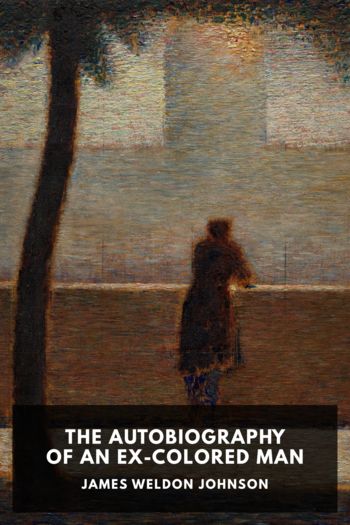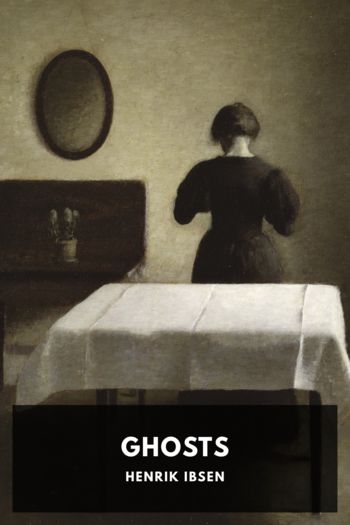Poetry - James Weldon Johnson (moboreader .TXT) 📗

- Author: James Weldon Johnson
Book online «Poetry - James Weldon Johnson (moboreader .TXT) 📗». Author James Weldon Johnson
The staggering force of brutish might,
That strikes and leaves us stunned and dazed;
The long, vain waiting through the night
To hear some voice for justice raised.
Full well I know the hour when hope
Sinks dead, and ’round us everywhere
Hangs stifling darkness, and we grope
With hands uplifted in despair.
Courage! Look out, beyond, and see
The far horizon’s beckoning span!
Faith in your God-known destiny!
We are a part of some great plan.
Because the tongues of Garrison
And Phillips now are cold in death,
Think you their work can be undone?
Or quenched the fires lit by their breath?
Think you that John Brown’s spirit stops?
That Lovejoy was but idly slain?
Or do you think those precious drops
From Lincoln’s heart were shed in vain?
That for which millions prayed and sighed,
That for which tens of thousands fought,
For which so many freely died,
God cannot let it come to naught.
How would you have us, as we are?
Or sinking ’neath the load we bear?
Our eyes fixed forward on a star?
Or gazing empty at despair?
Rising or falling? Men or things?
With dragging pace or footsteps fleet?
Strong, willing sinews in your wings?
Or tightening chains about your feet?
O black and unknown bards of long ago,
How came your lips to touch the sacred fire?
How, in your darkness, did you come to know
The power and beauty of the minstrel’s lyre?
Who first from midst his bonds lifted his eyes?
Who first from out the still watch, lone and long,
Feeling the ancient faith of prophets rise
Within his dark-kept soul, burst into song?
Heart of what slave poured out such melody
As “Steal away to Jesus”? On its strains
His spirit must have nightly floated free,
Though still about his hands he felt his chains.
Who heard great “Jordan roll”? Whose starward eye
Saw chariot “swing low”? And who was he
That breathed that comforting, melodic sigh,
“Nobody knows de trouble I see”?
What merely living clod, what captive thing,
Could up toward God through all its darkness grope,
And find within its deadened heart to sing
These songs of sorrow, love and faith, and hope?
How did it catch that subtle undertone,
That note in music heard not with the ears?
How sound the elusive reed so seldom blown,
Which stirs the soul or melts the heart to tears.
Not that great German master in his dream
Of harmonies that thundered amongst the stars
At the creation, ever heard a theme
Nobler than “Go down, Moses.” Mark its bars
How like a mighty trumpet-call they stir
The blood. Such are the notes that men have sung
Going to valorous deeds; such tones there were
That helped make history when Time was young.
There is a wide, wide wonder in it all,
That from degraded rest and servile toil
The fiery spirit of the seer should call
These simple children of the sun and soil.
O black slave singers, gone, forgot, unfamed,
You—you alone, of all the long, long line
Of those who’ve sung untaught, unknown, unnamed,
Have stretched out upward, seeking the divine.
You sang not deeds of heroes or of kings;
No chant of bloody war, no exulting paean
Of arms-won triumphs; but your humble strings
You touched in chord with music empyrean.
You sang far better than you knew; the songs
That for your listeners’ hungry hearts sufficed
Still live—but more than this to you belongs:
You sang a race from wood and stone to Christ.
O Southland! O Southland!
Have you not heard the call,
The trumpet blown, the word made known
To the nations, one and all?
The watchword, the hope-word,
Salvation’s present plan?
A gospel new, for all—for you:
Man shall be saved by man.
O Southland! O Southland!
Do you not hear to-day
The mighty beat of onward feet,
And know you not their way?
’Tis forward, ’tis upward,
On to the fair white arch
Of Freedom’s dome, and there is room
For each man who would march.
O Southland, fair Southland!
Then why do you still cling
To an idle age and a musty page,
To a dead and useless thing?
’Tis springtime! ’Tis work-time!
The world is young again!
And God’s above, and God is love,
And men are only men.
O Southland! my Southland!
O birthland! do not shirk
The toilsome task, nor respite ask,
But gird you for the work.
Remember, remember
That weakness stalks in pride;
That he is strong who helps along
The faint one at his side.
Have you been sore discouraged in the fight,
And even sometimes weighted by the thought
That those with whom and those for whom you fought
Lagged far behind, or dared but faintly smite?
And that the opposing forces in their might
Of blind inertia rendered as for naught
All that throughout the long years had been wrought,
And powerless each blow for Truth and Right?
If so, take new and greater courage then,
And think no more withouten help you stand;
For sure as God on His eternal throne
Sits, mindful of the sinful deeds of men,
—The awful Sword of Justice in His hand—
You shall not, no, you shall not, fight alone.
(On an Incident at the Battle of San Juan Hill)
Under a burning tropic sun,
With comrades around him lying,
A trooper of the sable Tenth
Lay wounded, bleeding, dying.
First in the charge up the fort-crowned hill,
His company’s guidon bearing,
He had rushed where the leaden hail fell fast,
Not death nor danger fearing.
He fell in the front where the fight grew fierce,
Still faithful in life’s last labor;
Black though his skin, yet his heart as true
As the steel of his blood-stained saber.
And while the battle around him rolled,
Like the roar of a sullen breaker,
He closed his eyes on the bloody scene,
And presented arms to his Maker.
There he lay, without honor or rank,
But, still, in a grim-like beauty;
Despised of men for his humble race,
Yet true, in death, to his duty.
O whitened head entwined in turban gay,
O kind black face, O crude, but tender hand,
O foster-mother in whose arms there lay
The race whose sons are masters of the land!
It was thine arms that sheltered in their fold,
It was thine eyes





Comments (0)